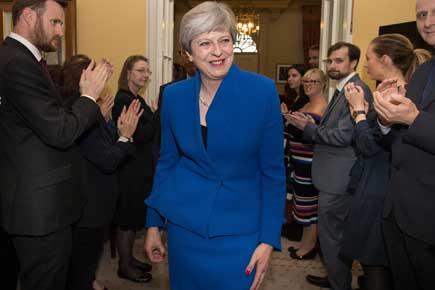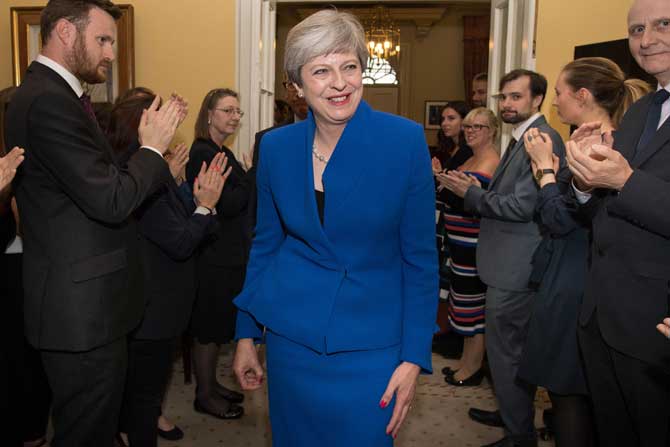British Prime Minister Theresa May will form a government supported by a small Northern Irish party after her Conservative Party lost its parliamentary majority in an election debacle days before talks on Britain's EU departure are due to begin

 Britain's Prime Minister Theresa May and her husband Philip are clapped into number 10 Downing Street by the staff after her visit with Britain's Queen Elizabeth II at Buckingham Palace where she was requested to form a new government, in central London on Friday. Pic/AFP
Britain's Prime Minister Theresa May and her husband Philip are clapped into number 10 Downing Street by the staff after her visit with Britain's Queen Elizabeth II at Buckingham Palace where she was requested to form a new government, in central London on Friday. Pic/AFP
ADVERTISEMENT
British Prime Minister Theresa May will form a government supported by a small Northern Irish party after her Conservative Party lost its parliamentary majority in an election debacle days before talks on Britain's EU departure are due to begin.
A stony-faced May, speaking on the doorstep of her official Downing Street residence, said the government would provide certainty and lead Britain in talks with the European Union to secure a successful Brexit deal.
May said she could rely in parliament on the support of her "friends" in Northern Ireland's Democratic Unionist Party after her governing Conservatives failed to emerge as clear winners.
Confident of securing a sweeping victory, May had called the snap election to strengthen her hand in the European Union divorce talks.
But in one of the most sensational nights in British electoral history, a resurgent Labour Party denied her an outright win, throwing the country into political turmoil.
EU leaders expressed fears that May's shock loss of her majority would delay the Brexit talks, due to begin on June 19, and so raise the risk of negotiations failing.
Her Labour rival Jeremy Corbyn, once written off by his opponents as a no-hoper, said May should step down and he wanted to form a minority government.
But May, facing scorn for running a lacklustre campaign, was determined to hang on. Just after noon, she was driven the short distance from Downing Street to Buckingham Palace to ask Queen Elizabeth for permission to form a government - a formality under the British system.
With 649 of 650 seats declared, the Conservatives had won 318 seats and Labour 261 followed by the pro-independence Scottish National Party on 34.
The shock result thrust Northern Ireland's centre-right DUP into the role of kingmaker, with its 10 seats enough to give the Conservatives a fragile but workable partnership.
"Our two parties have enjoyed a strong relationship over many years and this gives me the confidence to believe that we will be able to work together in the interests of the whole United Kingdom," May said.
This was likely to involve an arrangement in which the DUP would support a Conservative minority government on key votes in parliament but not form a formal coalition.
But with the complex talks on the divorce from the EU due to start in 10 days, it was unclear what their direction would now be and if the so-called "Hard Brexit" taking Britain out of a single market could still be pursued.
After winning his own seat in north London, Corbyn said May's attempt to win a bigger mandate had backfired.
"The mandate she's got is lost Conservative seats, lost votes, lost support and lost confidence," he said.
"I would have thought that's enough to go, actually, and make way for a government that will be truly representative of all of the people of this country."
BREXIT RISKS
"We need a government that can act," EU Budget Commissioner Guenther Oettinger told German broadcaster Deutschlandfunk.
"With a weak negotiating partner, there's a danger that the (Brexit) negotiations will turn out badly for both sides."
The EU's chief negotiator said the bloc's stance on Brexit and the timetable for the talks were clear, but the divorce negotiations should only start when Britain is ready. "Let's put our minds together on striking a deal," Michel Barnier said.
 Subscribe today by clicking the link and stay updated with the latest news!" Click here!
Subscribe today by clicking the link and stay updated with the latest news!" Click here!







